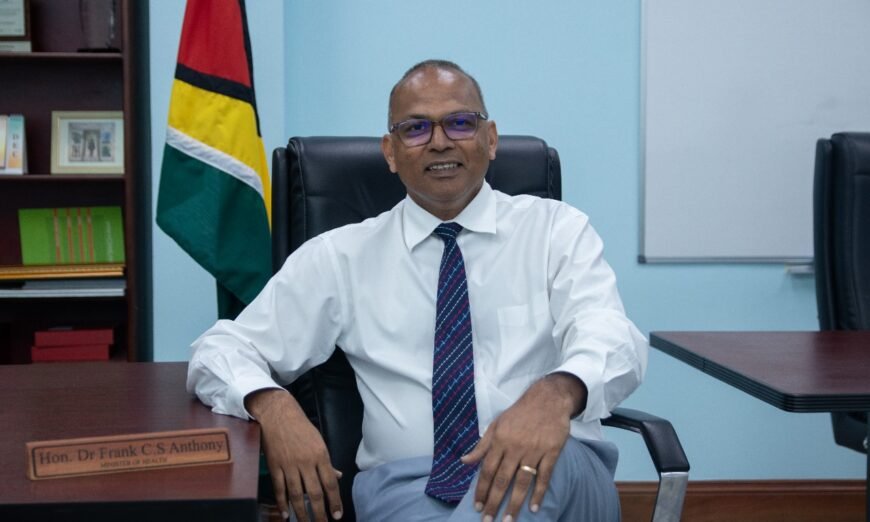“Guyana and India have developed strong bilateral ties in the healthcare sector, both at the governmental level and through the private sector. “
Guyana and India have been strengthening ties in various sectors, including healthcare. Can you highlight some of the recent collaborations between Guyana and India in the Healthcare sector and how they are benefiting your citizens?
Guyana and India have developed strong bilateral ties in the healthcare sector, both at the governmental level and through the private sector.
During Prime Minister Modi’s visit to Guyana, three important agreements were signed to improve health cooperation between the two countries. The first agreement is a Memorandum of Understanding (MoU) for recognising the Indian Pharmacopoeia. This Memorandum of Understanding (MoU) is between the Indian Pharmacopoeia Commission, a part of India’s Ministry of Health and Family Welfare, and the Ministry of Health of Guyana. The goal is to work together more closely and share important information about pharmaceutical regulations. By aligning their regulations, both countries aim to enhance the quality and safety of medicines, ensuring they meet the high standards set by their laws.
This partnership will help improve healthcare and strengthen the pharmaceutical sector in both nations.
HLL Lifecare Ltd has signed a Memorandum of Understanding (MoU) with the Ministry of Health of Guyana. This agreement focuses on the Janaushadhi Scheme, also known as the Pradhan Mantri Bhartiya Janaushadhi Pariyojana (PMBJP). The program aims to provide high-quality and affordable medicines to the people of Guyana. HLL Lifecare Ltd will supply a variety of essential medicines to the Ministry of Health. This will help healthcare facilities in Guyana access affordable pharmaceutical solutions. The partnership is expected to improve the availability of essential medications, enhance health outcomes, and support Guyana’s national healthcare system.
The third Memorandum of Understanding (MoU) is between the Central Drugs Standard Control Organisation (CDSCO) and the Ministry of Health of Guyana. This agreement will establish a framework for both parties to communicate and collaborate on medical products. This includes medicines, raw materials for making medicines, biological products, medical devices, and cosmetics.
In addition to the various memoranda of understanding (MoUs) established, the Export-Import Bank of India has announced the extension of a significant line of credit amounting to US$17.5 million. This funding is specifically designed to support the modernisation of Guyana’s healthcare infrastructure.
At the level of the private sector, local Guyanese companies have been proactively working with Indian companies in the importation of pharmaceuticals and reagents for various laboratory equipment.
Recently, the Ministry of Health signed an agreement with Apollo Hospitals, paving the way for various types of health collaboration.
UNICEF has been actively involved in improving healthcare in Guyana. Can you speak to some of the key projects or initiatives that UNICEF has supported in the country and how they align with your government’s health policies?
India supported UNICEF, allowing Guyana to benefit in several key areas:
- During the COVID-19 pandemic, we improved cold storage systems for vaccines. We also enhanced risk communication to combat misinformation about vaccines.
- In the area of Sexual and Reproductive Health among adolescents, we implemented menstrual hygiene education and peer education programs for in-school populations.
- We focused on improving mental health support for adolescents in various schools.
- In terms of nutrition, our initiatives from UNICEF emphasised the Baby-Friendly Hospital Initiative, breastfeeding, and early childhood development.
- Additionally, we provided support for the elimination of Mother-to-Child transmission of HIV and syphilis.
- Finally, we worked on enhancing health facilities through solar electrification assessments.
What Specific steps has the Guyanese government taken to improve healthcare services and facilities for its citizens, particularly in rural and underserved areas?
The Government of Guyana has undertaken significant initiatives to enhance healthcare services and facilities, particularly in rural and underserved regions. These include:
- Infrastructure development: new hospitals, health centres and health posts. Over the last four years, at least 200 facilities have been upgraded. And 30 new facilities were built. Twelve new hospitals are currently under construction.
- Training for health professionals has been decentralised, with approximately 4,000 individuals currently in training.
- Over the last three years, the Ministry of Health (MoH) has recruited at least 2,000 new staff to expand healthcare services.
- Expansion of primary healthcare has resulted in approximately 115 interventions now being offered at all primary care centres.
- Telemedicine at 81 remote health clinics.
- Specialised medical teams are regularly deployed to remote areas to provide medical care.
What are the primary health challenges currently faced by Guyana, and how is the Ministry of Health working to address these issues through partnerships with international organisations and countries like India?
A significant challenge we face in the healthcare sector is the persistent shortage of skilled healthcare workers. In response to this pressing issue, the government has committed substantial financial resources to expand training initiatives aimed at producing more healthcare professionals.
One of the landmark developments in our approach is the introduction of a hybrid training program specifically designed for nursing assistants and nurses. This innovative program combines online coursework with practical, hands-on training, ensuring that participants gain both theoretical knowledge and real-world experience.
Additionally, we have recently entered into a strategic partnership with Medvarsity, a leading training program based in India, renowned for its comprehensive curriculum and expert-led courses. Through this collaboration, we aim to upskill various categories of healthcare professionals, including specialised nurses and doctors. By leveraging Medvarsity’s expertise and resources, we anticipate improving the quality of care provided in our healthcare system and effectively addressing the workforce shortage. This initiative is a key step in our broader strategy to enhance healthcare delivery and sustain a robust healthcare workforce for the future.

